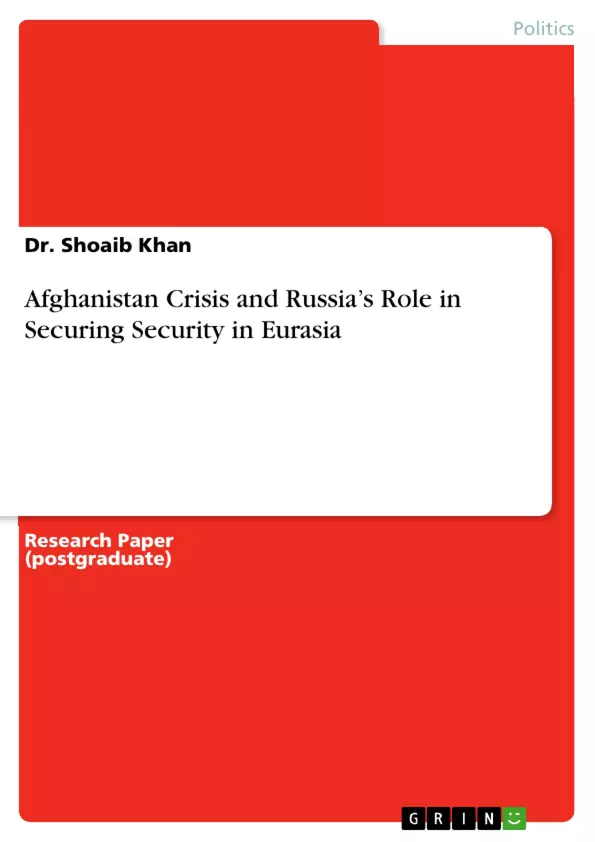This paper focuses on Russia's evolving perception of NATO and the Kremlin's concern of the alliance's intentions. Russian perception in the post Cold War has gone full circle from viewing NATO as an organization to join and strengthen Russia's pro-Western identity choice to perceiving the alliance as a military and civilizational threat. The experience of the Cold War besides the interaction of the post-Cold War with NATO contributed to Russia's increasingly hardening perception of the alliance.
It concentrates on Russia’s competition with the West, Afghanistan still proves to be the battleground. Russian desires and expectation from its contemporary policy in Afghanistan, for which there is a need to understand. Maintaining its influence and preventing U.S. military bases in the region are the priorities of Moscow’s Afghan policy, besides challenging the United States amidst worsening relations between Moscow and Washington. The Russian assumption as per which the Taliban will play a huge role in the country in the near future, and therefore aims to be on good terms with the Taliban. Reassuring Central Asian states that their security concerns and also having a control on the potentiality of spillover effects. These are taken seriously remains a key priority for the Russian government and has been central in public comments.
Inhaltsverzeichnis (Table of Contents)
- Introduction
- Policy of Moscow towards Kabul
- The Phases of Great Game in the Country
- Perspective of Moscow in the Post-US withdrawal
- Conclusion
Zielsetzung und Themenschwerpunkte (Objectives and Key Themes)
This paper examines Russia's evolving perception of NATO and its concerns about the alliance's intentions. It further explores Russia's competition with the West in the context of Afghanistan, analyzing Moscow's objectives and expectations for its contemporary Afghan policy.
- Russia's changing perception of NATO from a potential partner to a threat.
- Moscow's competition with the West in Afghanistan.
- Russia's priorities for its Afghan policy, including maintaining its influence and preventing US military bases.
- The role of the Taliban in Russia's Afghan strategy.
- Russia's concerns regarding security threats in Central Asia and the potential for spillover effects from Afghanistan.
Zusammenfassung der Kapitel (Chapter Summaries)
- Introduction: This chapter introduces the concept of Eurasia as a supercontinent, highlighting its significance in global politics and its role in shaping Russia's geopolitical strategy. It also discusses the historical context of Russia's engagement in the region, particularly in relation to the former USSR and the Commonwealth of Independent States (CIS).
- Policy of Moscow towards Kabul: This chapter delves into Russia's evolving policy towards Afghanistan, emphasizing its strategic interests in the region, particularly in relation to security, energy projects, and maintaining its influence. It also explores Moscow's concerns regarding the Taliban and its potential influence in the future.
- The Phases of Great Game in the Country: This chapter provides a historical overview of Russia's involvement in Afghanistan, focusing on the "Great Game" and the evolving dynamics of regional power struggles. It examines the role of Afghanistan as a buffer zone and the changing perceptions of Moscow towards the country over time.
- Perspective of Moscow in the Post-US withdrawal: This chapter analyzes Russia's perspective on the post-US withdrawal from Afghanistan, highlighting its strategic concerns and opportunities in the new geopolitical landscape. It explores Moscow's potential role in shaping the future of Afghanistan and its relationship with Central Asian states.
Schlüsselwörter (Keywords)
The main keywords and focus topics of the text are Afghanistan, Russia, Asia, Central Asia, NATO, United States, and CIS. These terms encapsulate the primary themes and concepts of the work, highlighting Russia's evolving strategic interests and its role in the region.
- Quote paper
- Dr. Shoaib Khan (Author), 2018, Afghanistan Crisis and Russia’s Role in Securing Security in Eurasia, Munich, GRIN Verlag, https://www.grin.com/document/1436290



